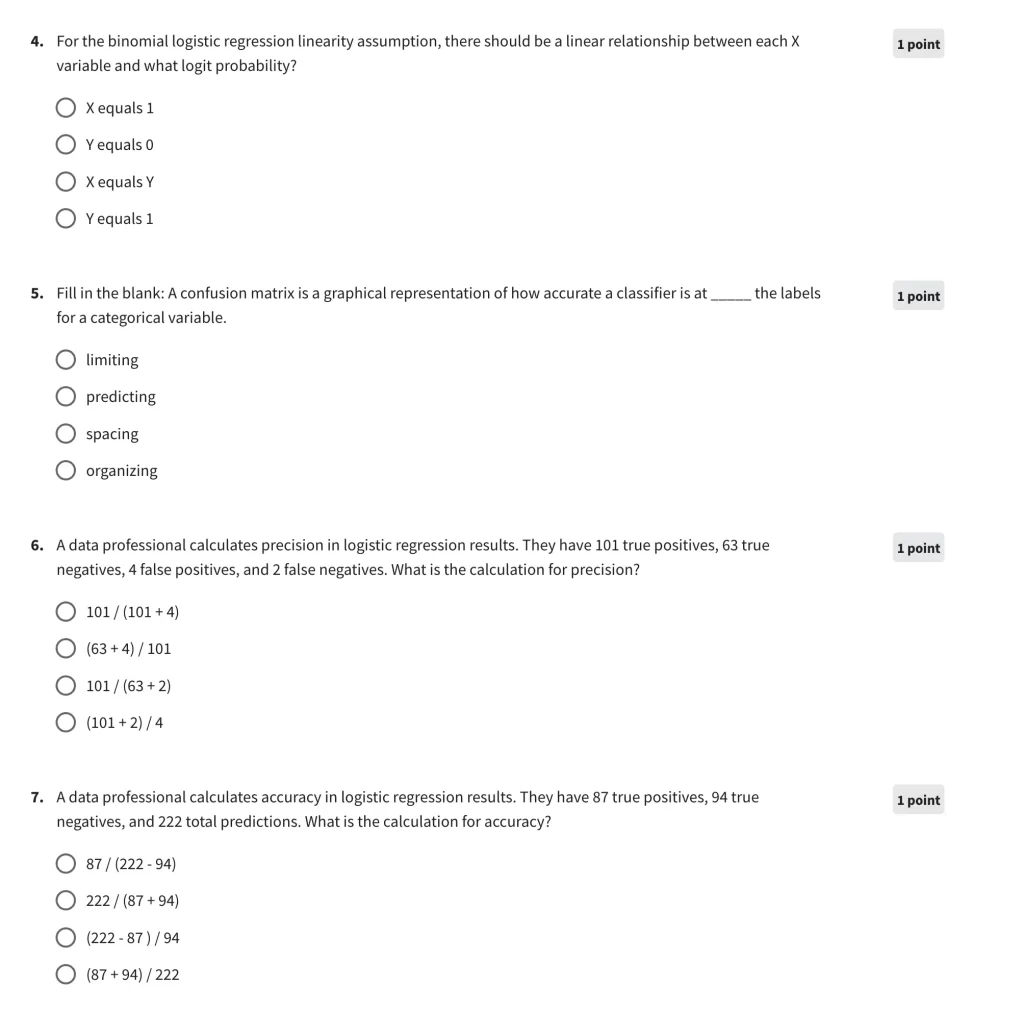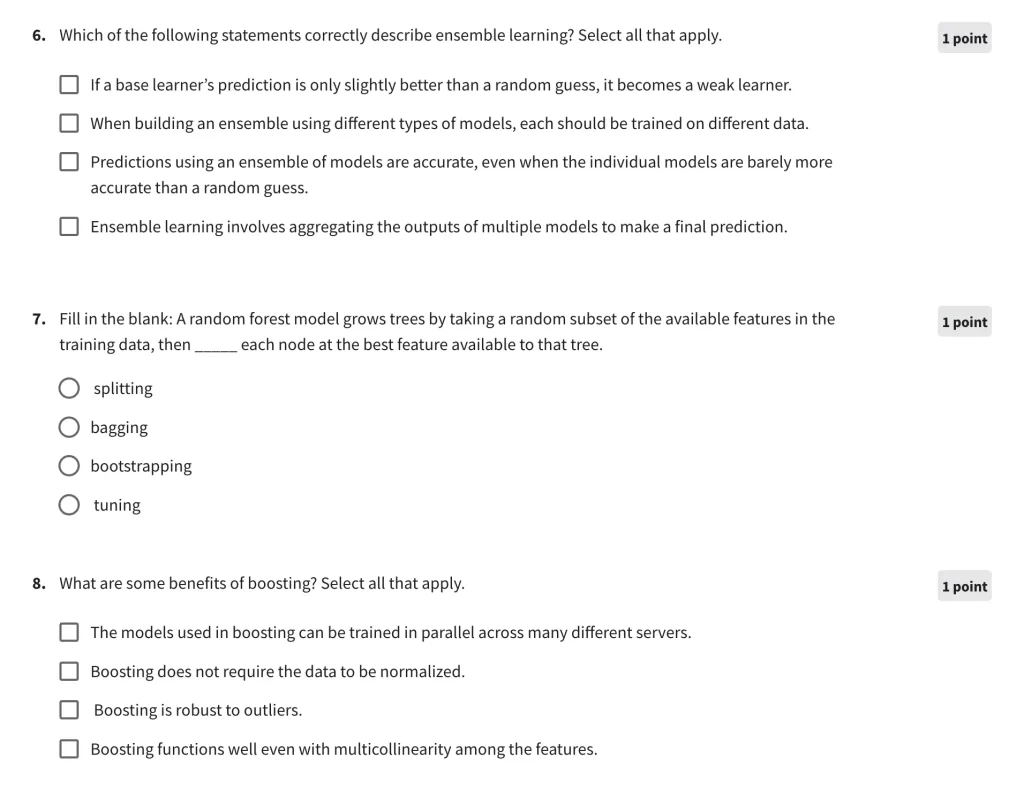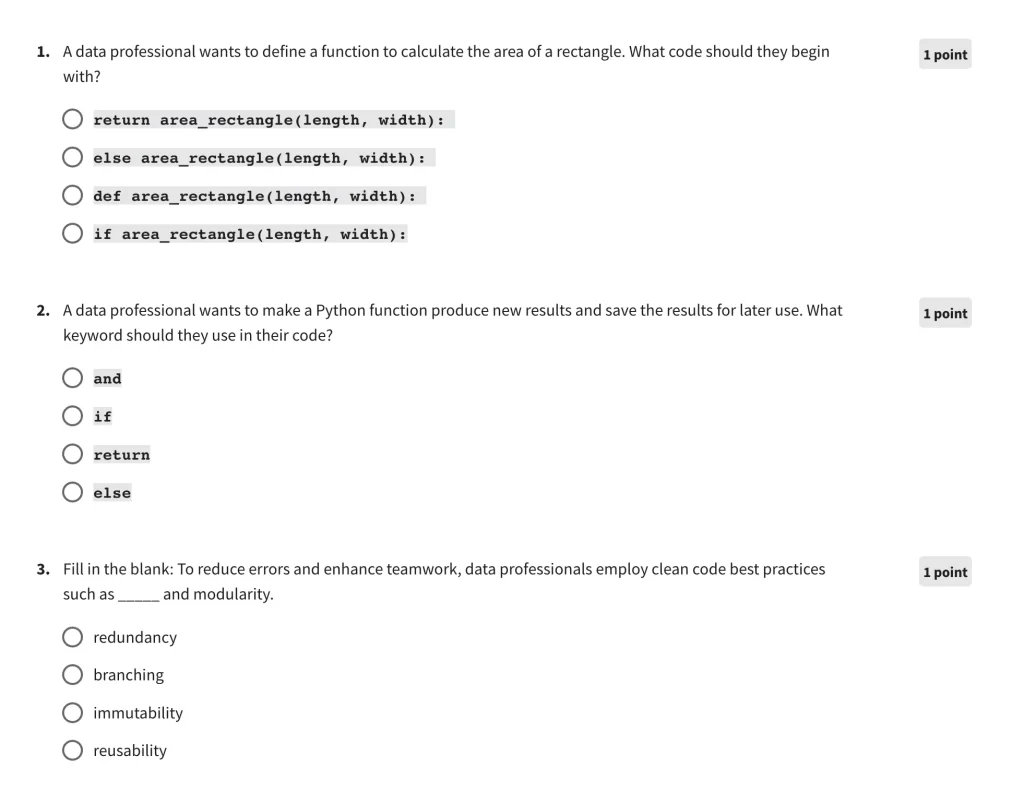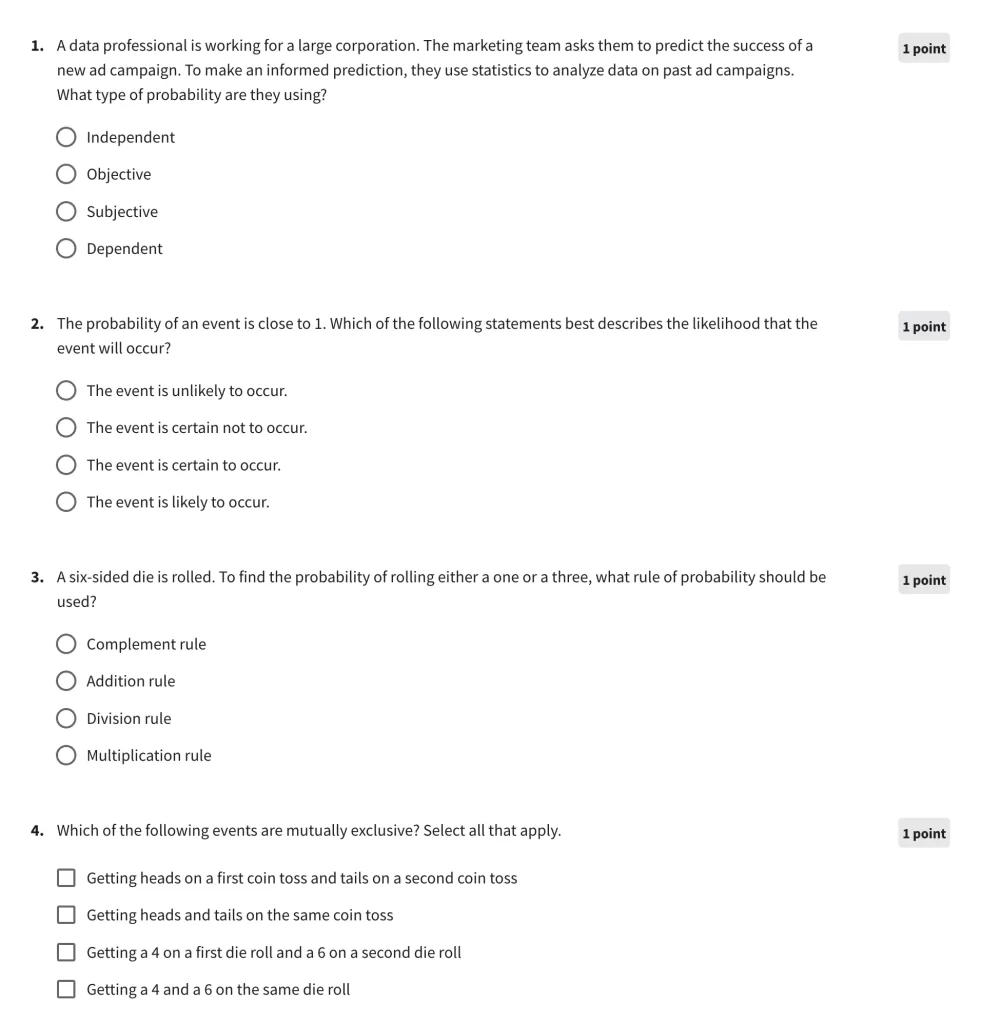- What is Google Advanced Data Analytics Certification?
- How Much Does Google Advanced Data Analytics Certification Cost?
- Google Advanced Data Analytics Certificate Contents
- Google Advanced Data Analytics Certification Exams
- How Hard is the Google Advanced Data Analytics Certification?
- Is the Google Advanced Data Analytics Certification Worth it?
- Other Google Career Certifications
- Other Data Analytics Certifications Worth Pursuing
In this review, you'll learn everything you need to know about the Google Advanced Data Analytics Professional Certificate.
We’ve gone through the courses and will explain what the lessons cover, what you'll learn from each course, and how much time you’ll need to get the Google Advanced Data Analytics Professional Certification.
To help you understand if this is the right course for you, we’ve added several screenshots to see what the learning environment looks like and what type of questions to expect in the exams.
If you want to take your data analytics career to the next level and pursue jobs with an annual salary of more than $100K, this is the certification to follow.
It builds on the popular Google Data Analytics Professional Certificate, made for beginners, and goes deeper into the actual tasks a senior data analyst is expected to do daily.
What is Google Advanced Data Analytics Certification?
The Google Advanced Data Analytics professional certification is among the best options for building advanced data analytics skills.
The course is designed by Google employees, and it’s the advanced version of the Google Data Analytics Professional Certification.
It’s a self-paced certificate that you complete 100% online without attending a normal classroom.
Who Should Follow this Certificate?
This is not a certification for beginners. It is specifically intended for those who have completed the Google Data Analytics Certificate or have equivalent data analytics expertise.
By obtaining this certificate, you can enhance your data analytics skills and experience to advance your career to the next level.
Upon completion, you can apply for various job roles such as senior data analyst, junior data scientist, data science analyst, and many others earning an annual salary of $120K.
What You’ll Learn?
The learning objectives of this course cover everything a senior data analyst is expected to do daily.
After completing the seven courses that are part of this certification, you will learn the following:
- Have a clear understanding of the role and responsibilities of data professionals.
- How to collect, analyze and interpret large amounts of data.
- How to manipulate large data sets using advanced data analytics techniques.
- How to use machine learning to teach computer systems to discover patterns in data.
- How to use predictive modeling, regression models, and experimental design.
- How to use popular data analytics tools like Jupyter Notebook, Python, and Tableau.
- How to create data visualizations and apply statistical methods to investigate data.
- How to communicate insights from data analysis to interested parties.
Time Investment and Certification
Completing the Google Advanced Data Analytics certificate may take up to six months. This assumes that you allocate 10 hours per week for studying.
It’s a self-paced course; all the material is available when you register for the certificate. This means that if you allocate more time, you can complete it in less time.
From experience, though, allocating 2 hours per day (weekdays only) is enough to digest the lessons and do the practical assignments.
How Much Does Google Advanced Data Analytics Certification Cost?
The total cost for the Google Advanced Data Analytics Certification is $294. The course is offered by Coursera through the Coursera Plus subscription.
Google subsidizes the subscription, which costs $49 per month. On average, it takes 6 months (6 X $49) for students to complete the course and get certified.
Coursera offers a 7-day free trial to review the course material before committing to a paid plan.
Google Advanced Data Analytics Certificate Contents
The Google Advanced Data Analytics certification includes seven online courses.
- Foundations of Data Science
- Get Started with Python
- Go Beyond the Numbers: Translate Data into Insights
- The Power of Statistics
- Regression Analysis: Simplify Complex Data Relationships
- The Nuts and Bolts of Machine Learning
- Google Advanced Data Analytics Capstone
Course 1: Foundations of Data Science
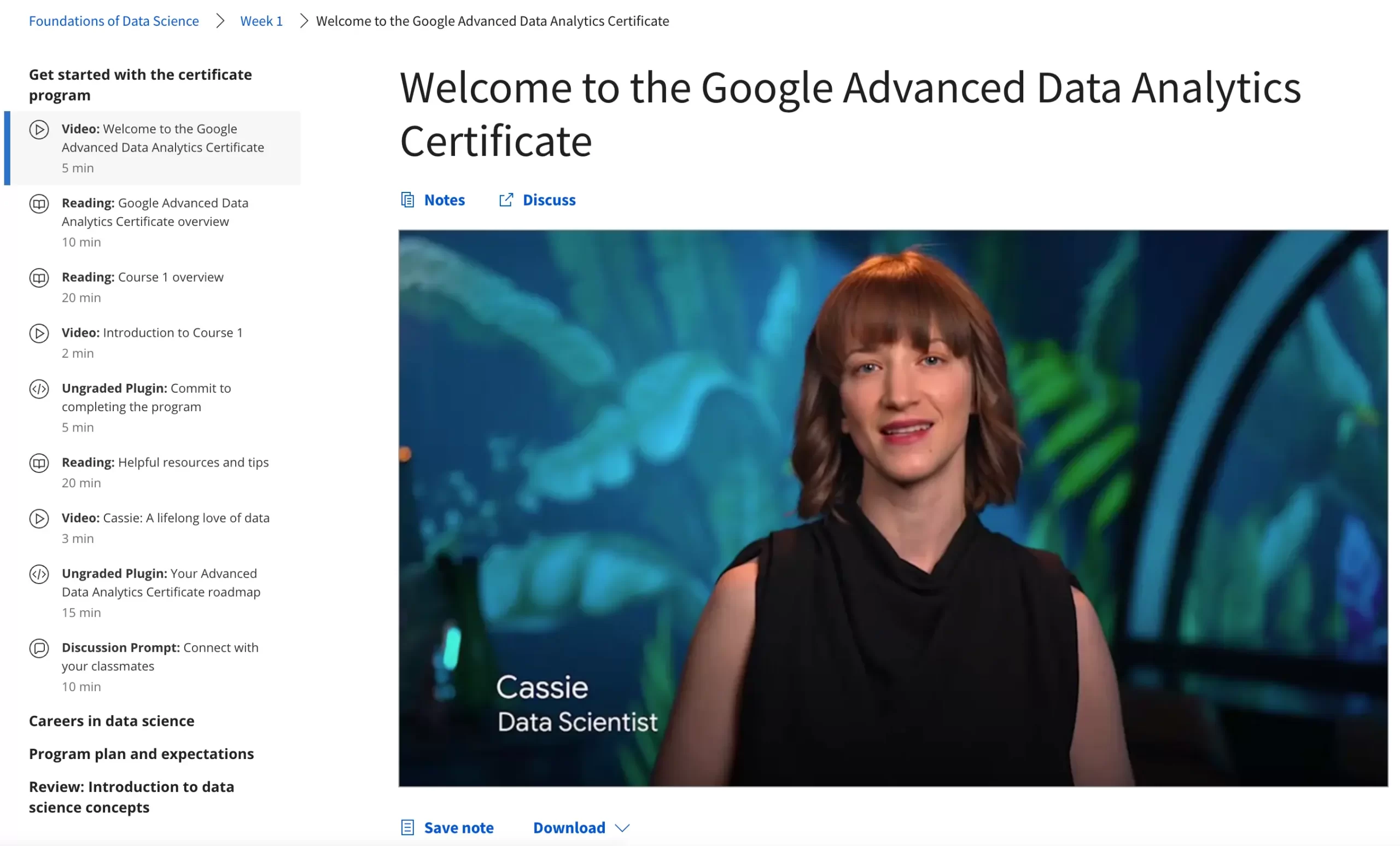
Foundations of Data Science is the first course on your path to becoming a Google Data Analytics certified professional.
As expected, this course explains in detail what the certification includes and what to expect from each course. It also provides a gentle introduction to the history of data science and how it is utilized in problem-solving today.
You’ll also gain an insight into the current job market for data science professionals and learn what analytical skills are required for data professionals to perform data analysis and how they collaborate with team members.
There are 17 graded assignments (multiple-choice quizzes) and a small project to complete before proceeding to the next course.
The project introduces you to PACE (Plan, Analyze, Construct, Execute) project workflow and how to use it to solve business problems.

The total time required to complete this course is 21 hours, but it can be completed in less time, especially if you’ve done online courses before.
Some of the topics are related to tips on how to approach your learning and how to use tools like Excel and Google Docs, and if you’re familiar with this, you don’t have to spend too much time on this course.
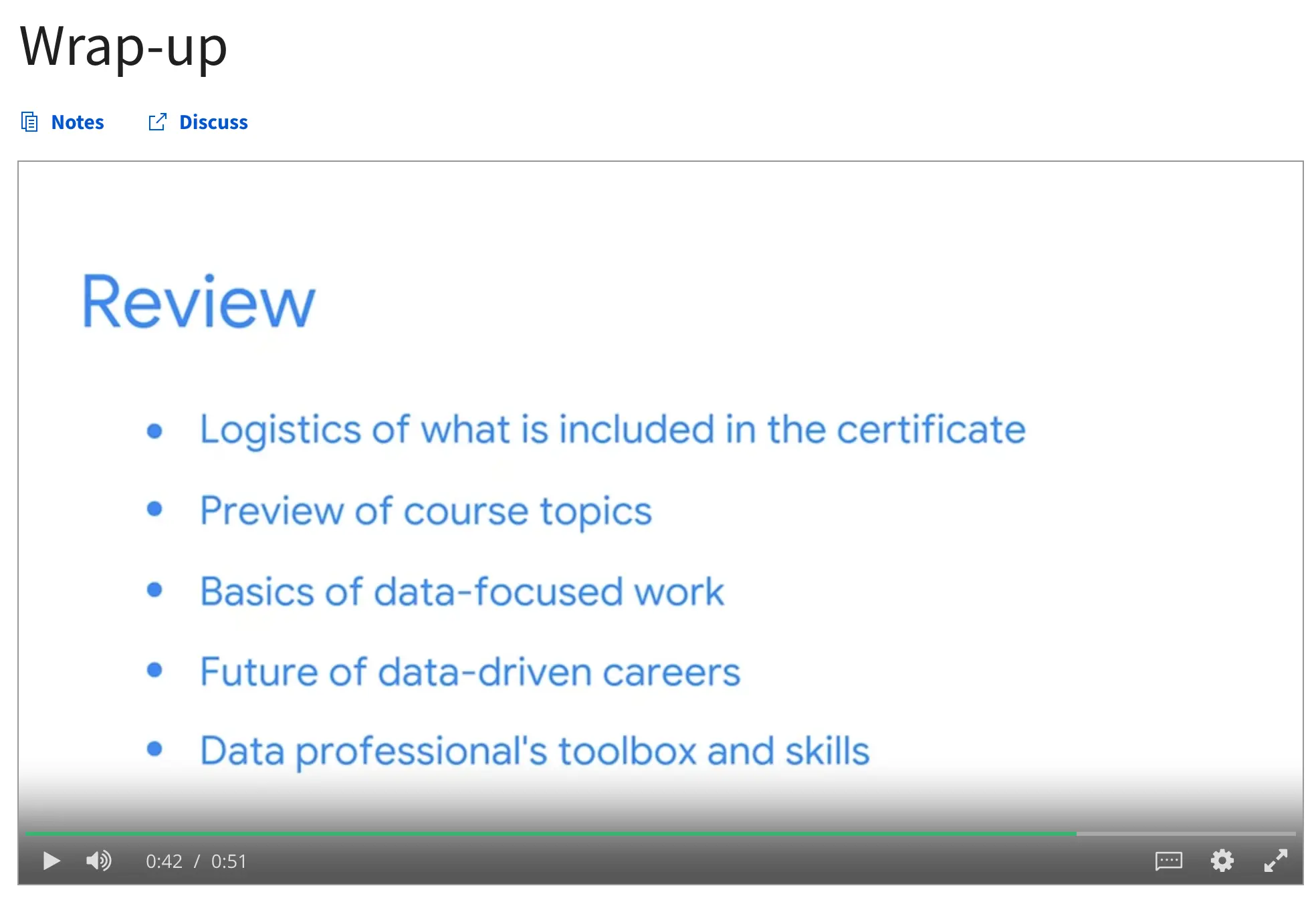
| Period | Topic | Time To Complete |
|---|---|---|
| Week 1 | Introduction to data science concepts | 5 hours |
| Week 2 | The impact of data today | 4 hours |
| Week 3 | Your career as a data professional | 3 hours |
| Week 4 | Data applications and workflow | 6 hours |
| Week 5 | Course 1 end-of-course project | 3 hours |
Course 2: Get Started with Python
The second course in your path to achieving Google's Advanced Data Analytics certification is all about Python. Python is one of the most popular programming languages for performing data analysis.
During Week 1, you’ll learn how Python works and what you can do with it.
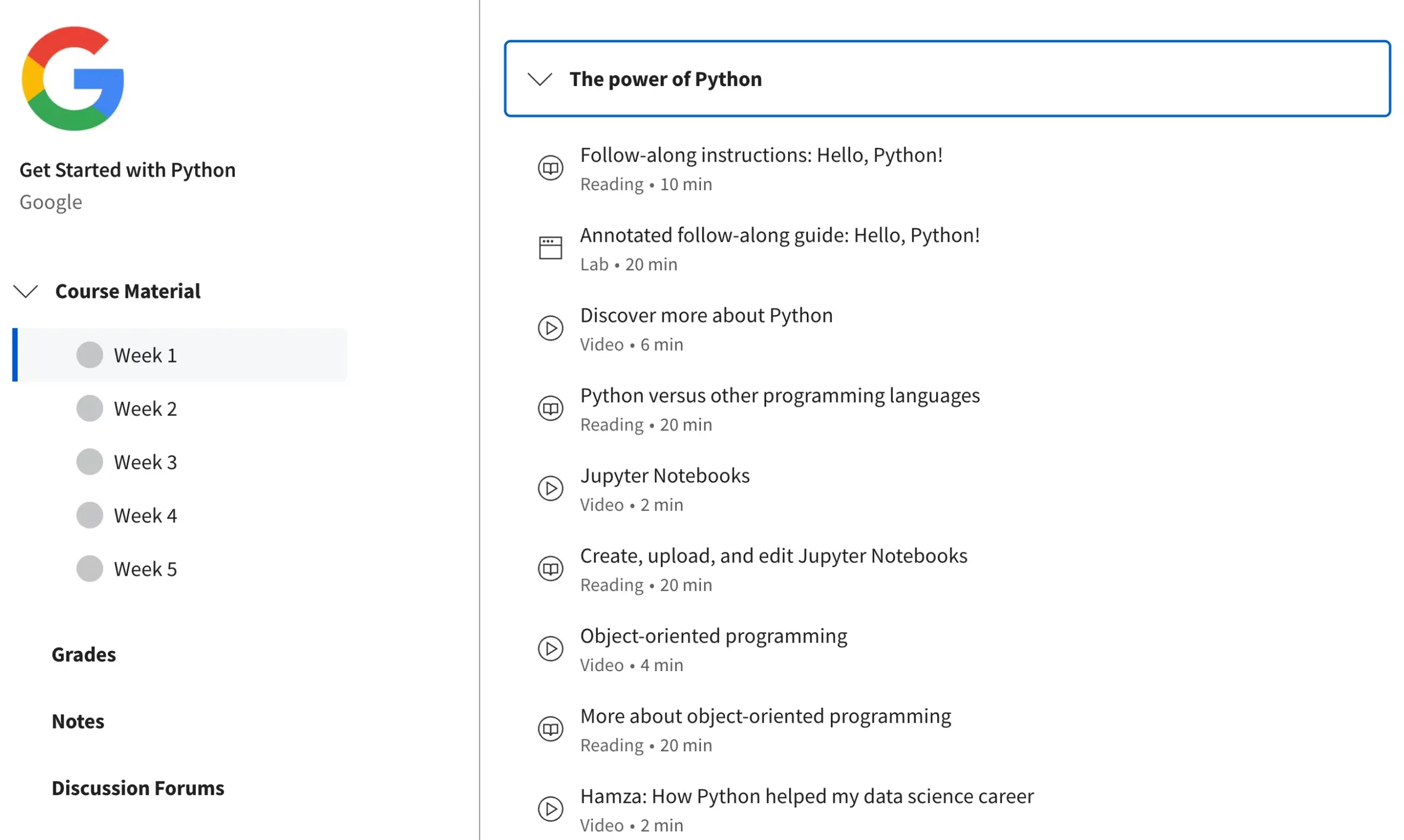
You will be introduced to data types, object-oriented programming concepts, and Jupyter Notebooks, the environment you’ll use to write Python code and create your projects.
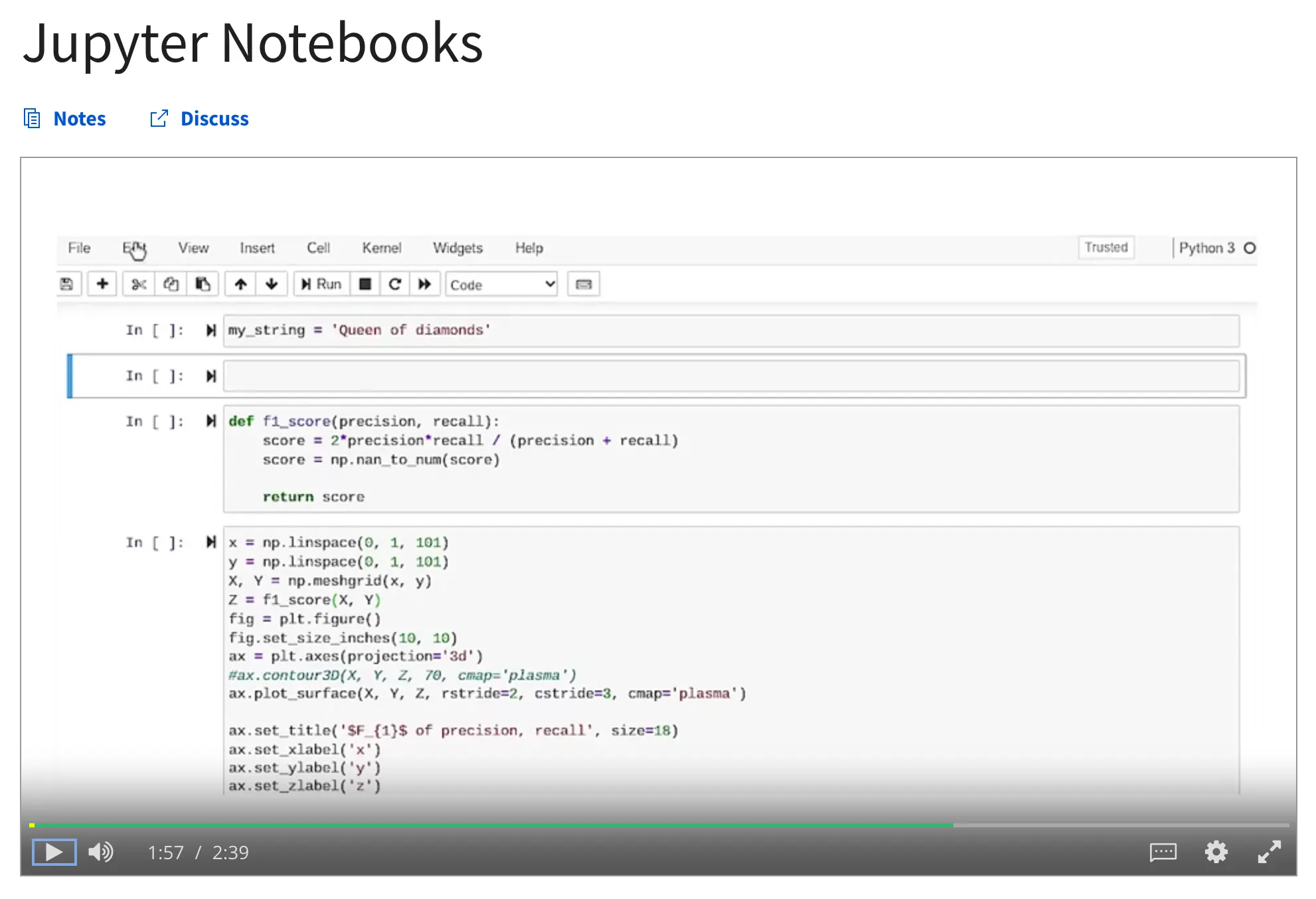
The total time required to complete Week 1 is 5 hours, and you’ll have to complete 3 graded quizzes and 3 ungraded labs.
For the upgraded labs, you can also view the solutions.
In week 2, you’ll go deeper into programming and learn how to create functions, conditional statements, and the principles of writing clean code.
Besides the videos, the learning material includes several reading resources and practice labs in Jupyter.
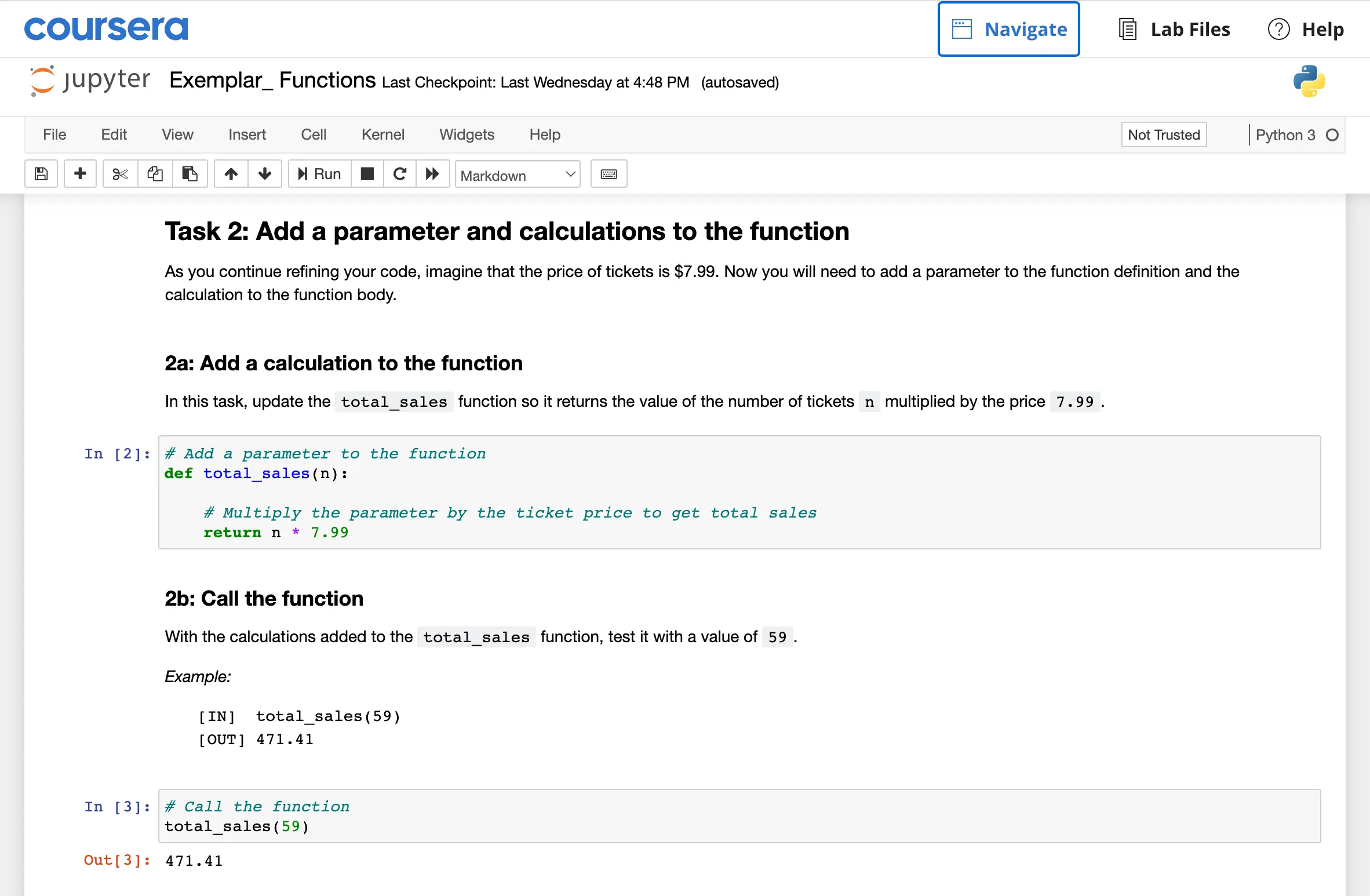
In weeks 3 and 4, you’ll continue your programming journey and learn more advanced programming concepts such as loops, data structures, arrays, and important Python tools for advanced data analysis like NumPy and pandas.
In week 5, you’ll have to complete an ungraded Lab. You will select a business problem from a list of options and use the given data to solve the problem.
The Get Started With Python is an easy course to complete, provided you have some programming experience. People who know any programming language can complete the course in 15 hours instead of the 22 hours proposed in the learning plan.
If you’re a complete beginner, you may have to spend more time on it since Python is an essential tool for any professional data analyst.
| Period | Topic | Time To Complete |
|---|---|---|
| Week 1 | Hello, Python! | 5 hours |
| Week 2 | Functions and conditional statements | 4 hours |
| Week 3 | Loops and strings | 5 hours |
| Week 4 | Data Structures in Python | 6 hours |
| Week 5 | Course 2 end-of-course project | 2 hours |
To learn more about Python, visit the following resources:
Course 3: Go Beyond the Numbers: Translate Data into Insights
The third course in the series is broken down into 5 weeks, and the total time to complete is around 28 hours.
It will teach you the fundamentals of data cleaning and visualizations
Week 1 has a lot of reading related to Exploratory data analysis (EDA), the PACE framework, and case studies on how real-life companies use these methods to solve data analysis problems.
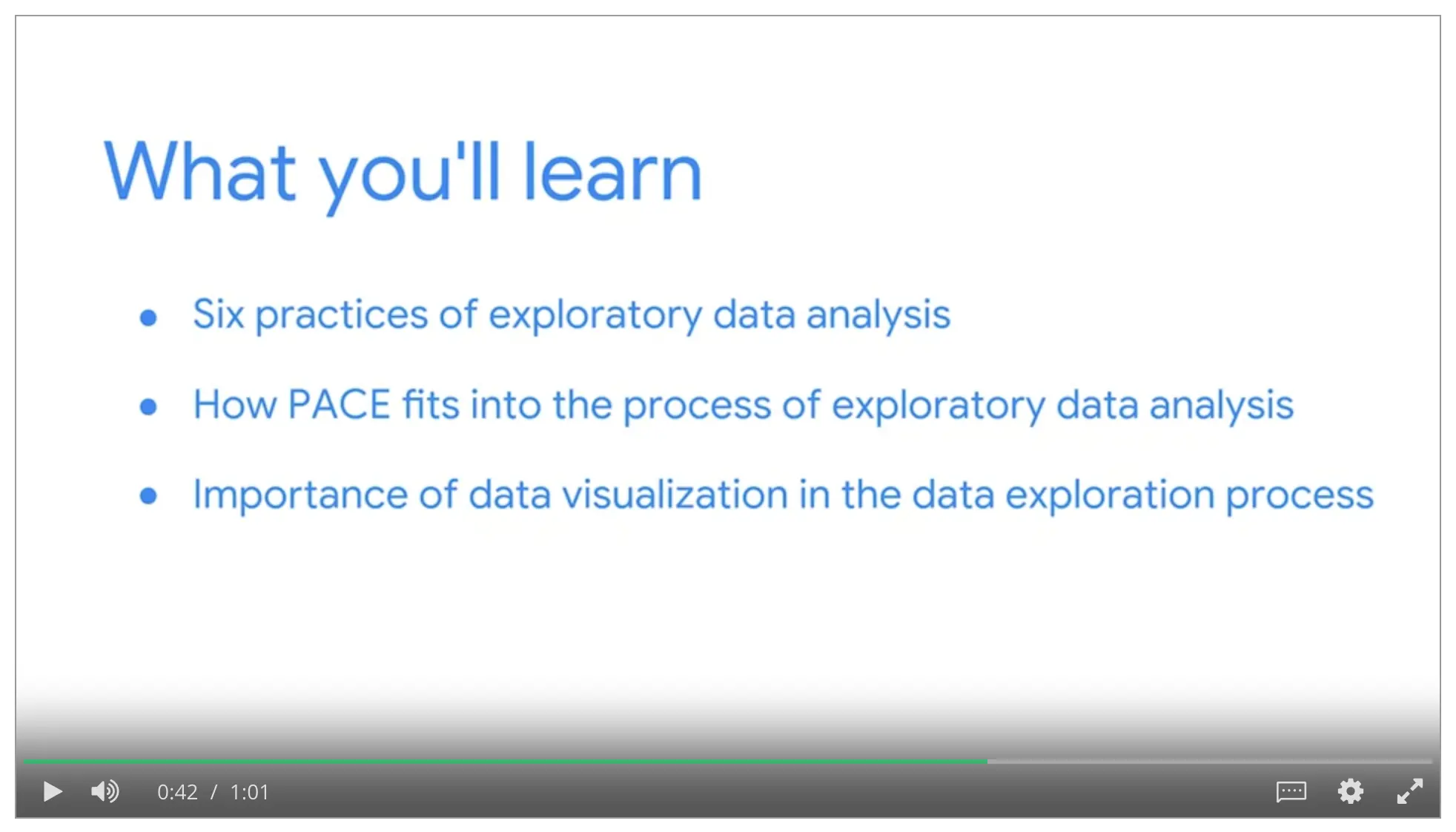
Week 2 is more practical as you’ll get a chance to use Python to perform several data manipulation functions like sorting, data cleaning, and filtering.
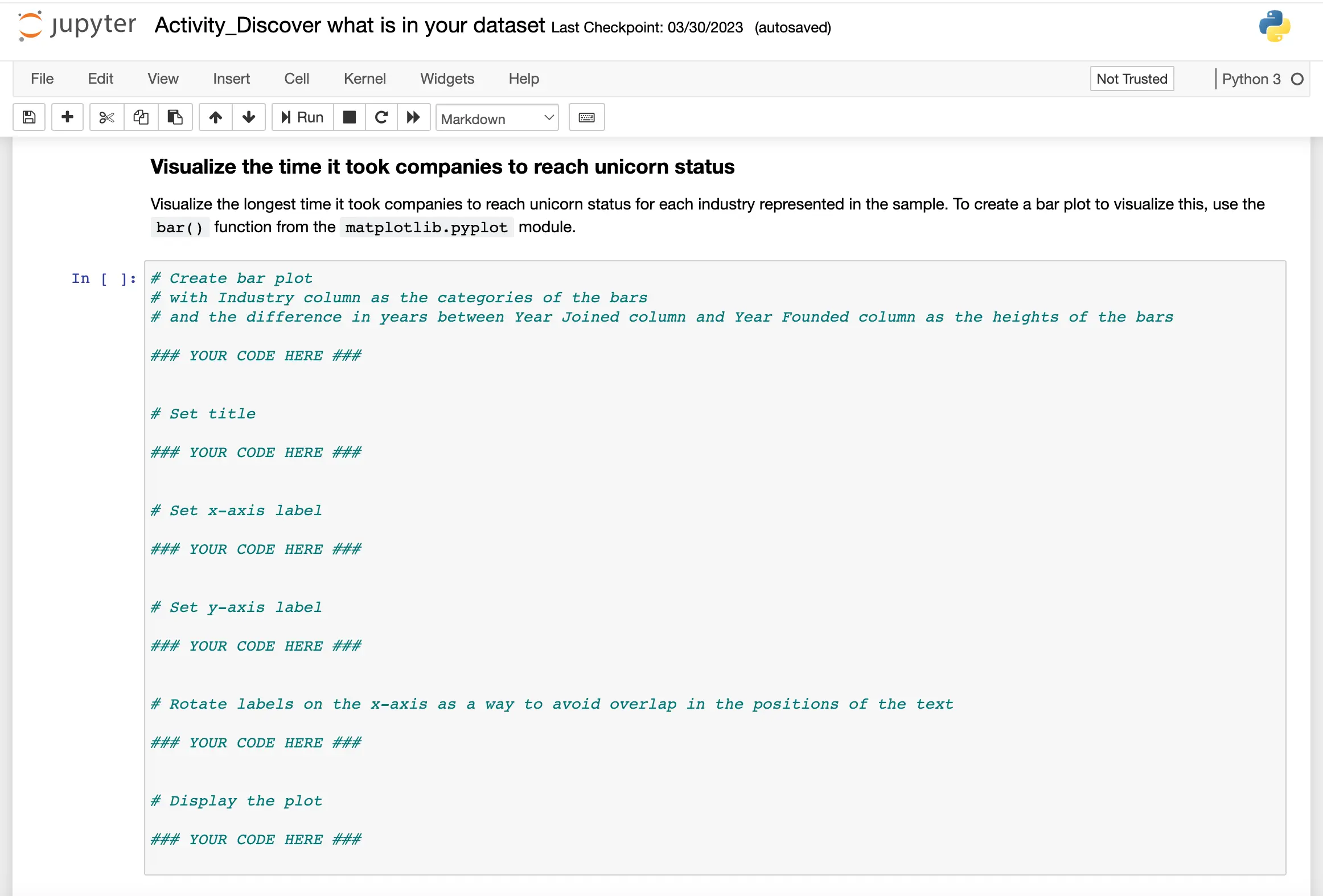
Week 3 continues on the same material as week 2, which is mostly labs on how to use Python to manipulate data.
Week 4 is more interesting as you’ll get a chance to work with advanced data visualization techniques in Tableau.
The final outcome will be an interactive US map with locations of lightning strikes for each year, which is pretty impressive.
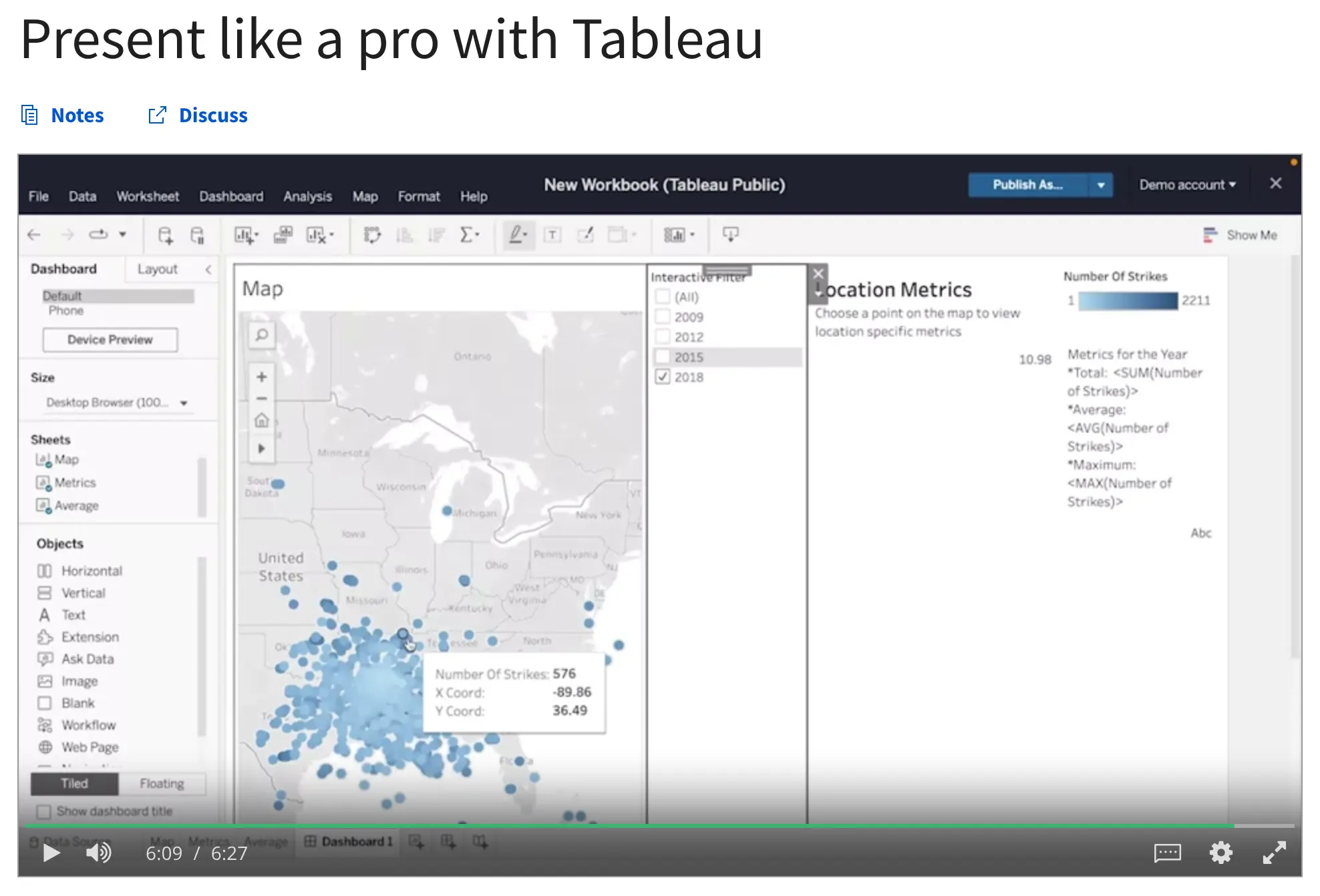
Here is a detailed breakdown of all the lessons in this course.
| Period | Topic | Time To Complete |
|---|---|---|
| Week 1 | Find and share stories using data | 3 hours |
| Week 2 | Explore raw data | 8 hours |
| Week 3 | Clean your data | 8 hours |
| Week 4 | Data visualizations and presentations | 5 hours |
| Week 5 | Course 3 end-of-course project | 4 hours |
Course 4: The Power of Statistics
The Power of Statistics is the fourth course in the Google Advanced Data Analytics Certificate.
This course teaches you how to use Python for statistics analysis. You’ll be introduced to concepts related to statistics, probability, sampling, and hypothesis testing.
In week 1, you’ll learn about the role of statistics in data science and how to use Python to compute descriptive statistics.
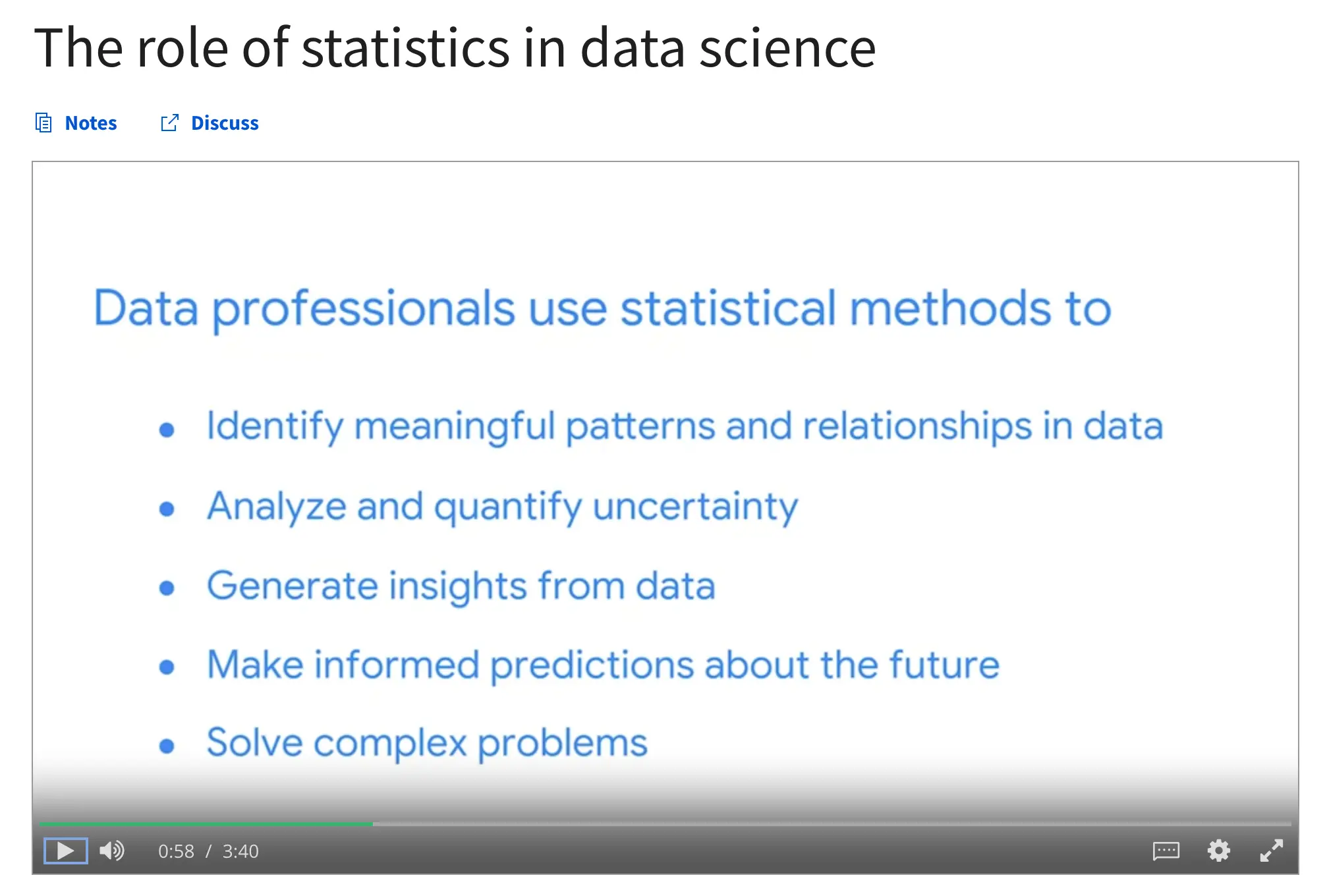
In the lab, you’ll be presented with a database, and your task will be to use Python to calculate the mean, median, minimum, and maximum values to uncover and analyze information from the given dataset.
In week 2, you’ll learn about the fundamentals of probability concepts. The first section is theoretical, and the second is practical with Python labs.
The total time to complete week 2 is 7 hours which is one of the time demanding weeks in the whole certification.
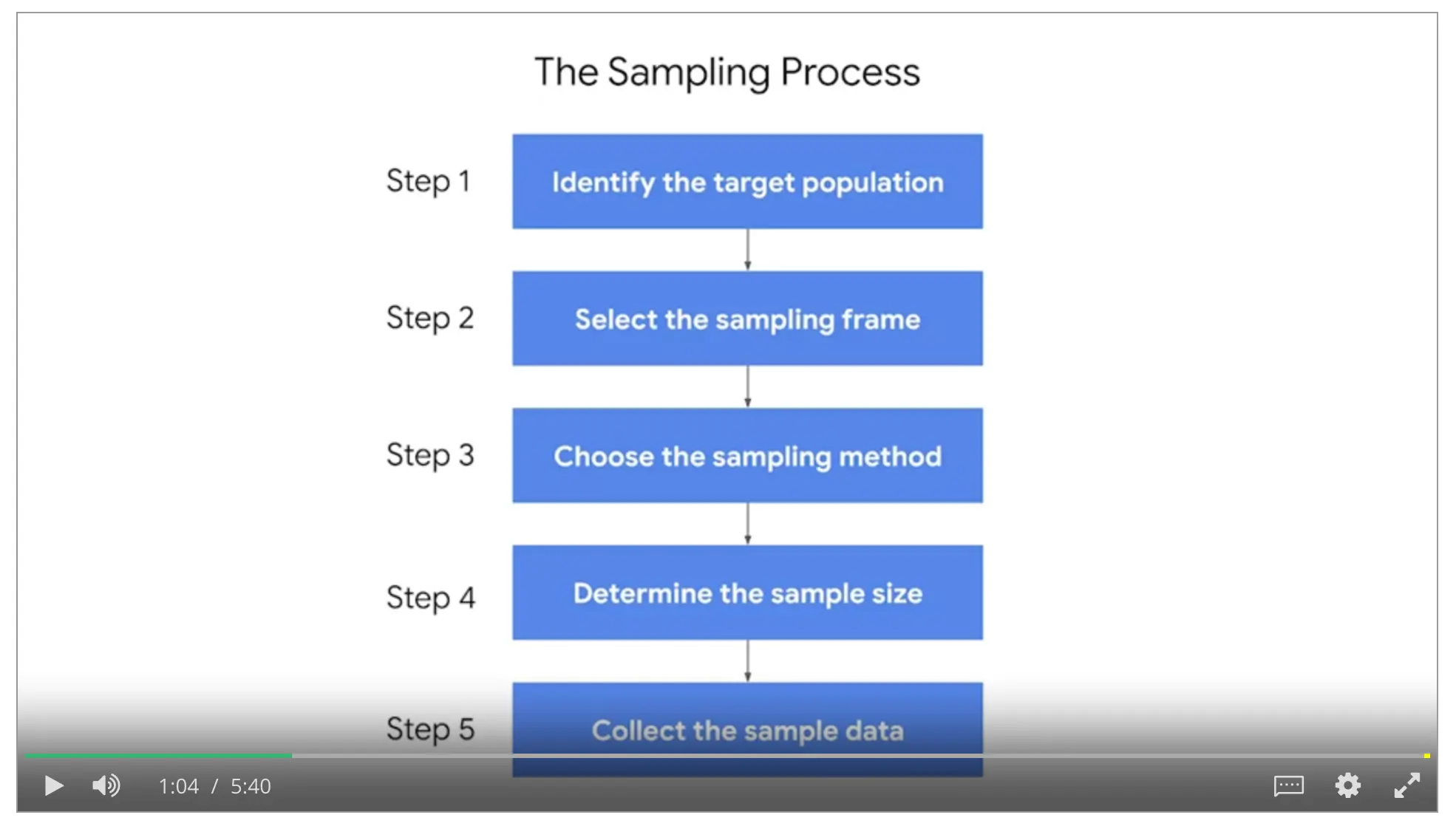
Weeks 3, 4, and 5 use a similar pattern. They combine theory and labs to help you learn about sampling, confidence intervals, and hypothesis testing.
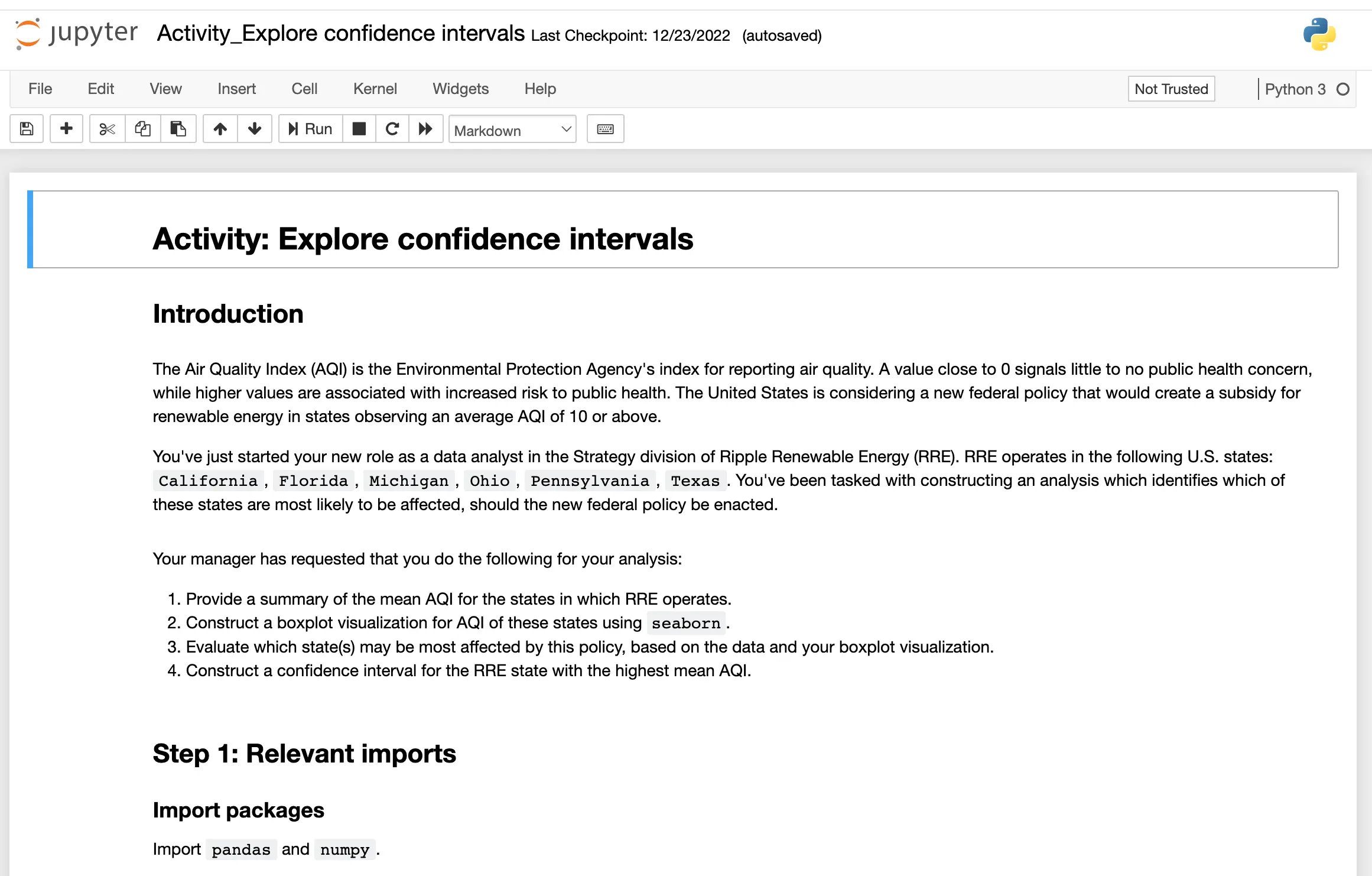
In week 6, you’ll have to complete the end-of-course project. The deliverables include a PACE strategy document, statistical analysis, and executive summary reporting.
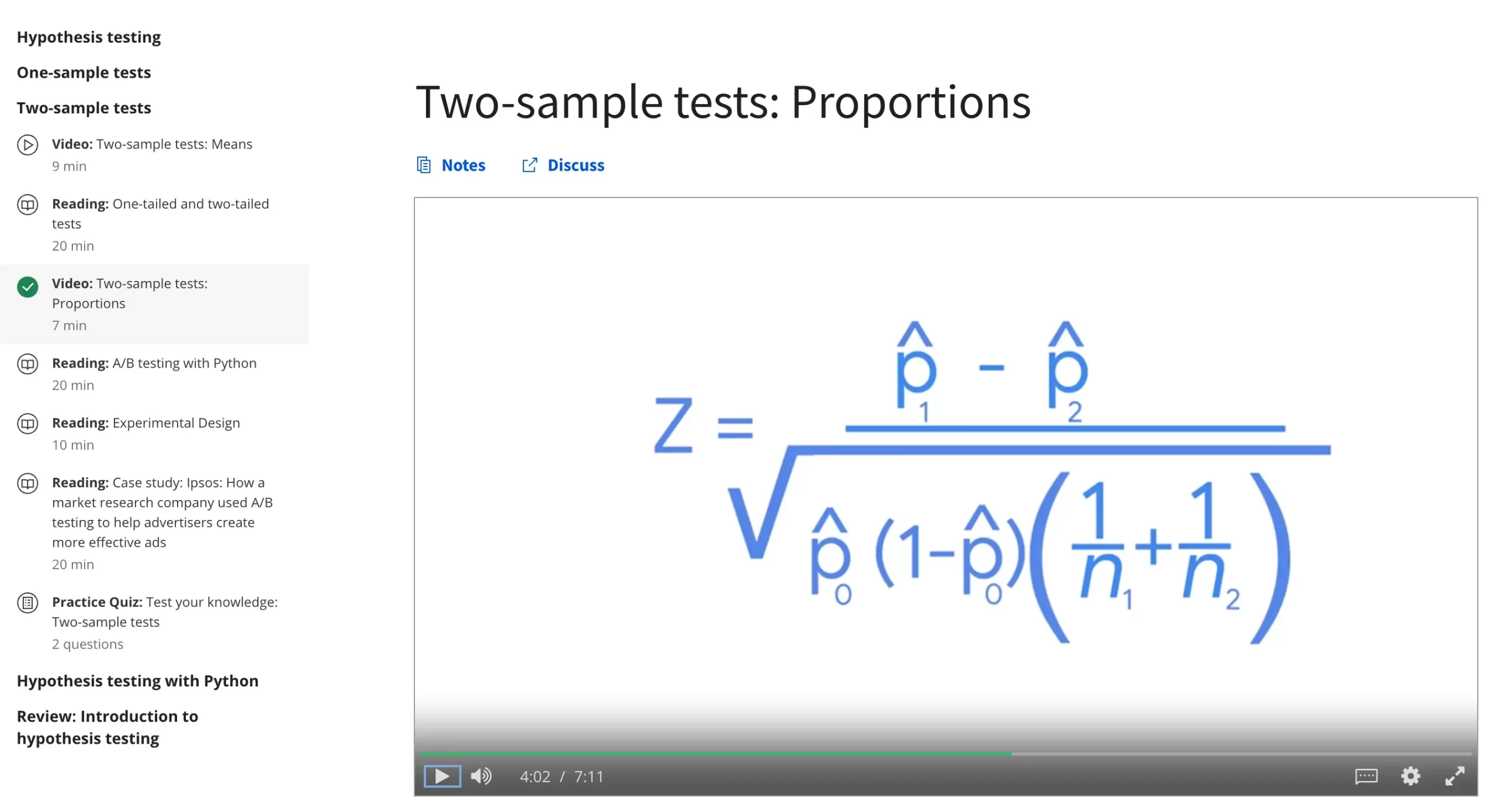
The lab will take around 1 hour to complete.
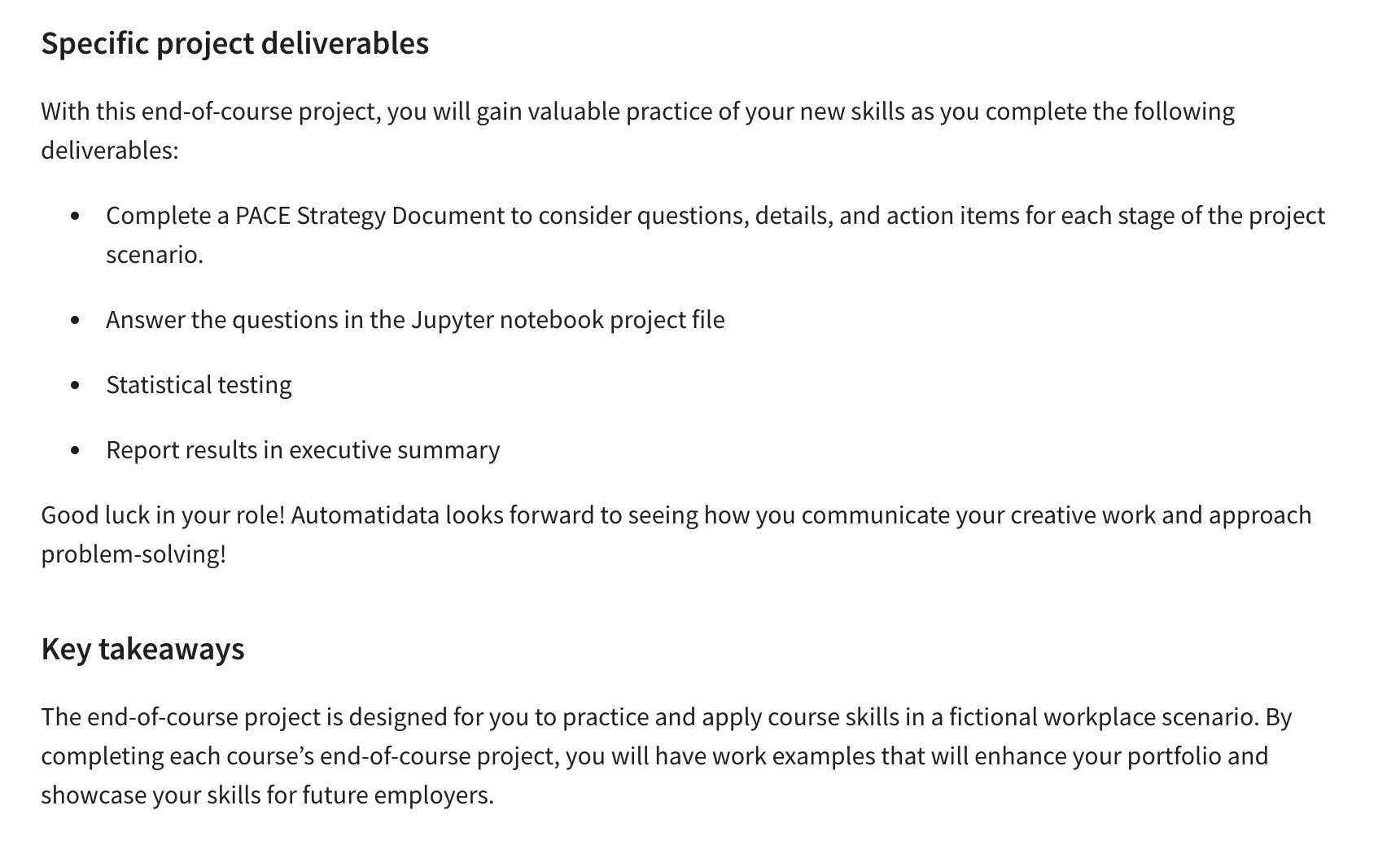
| Period | Topic | Time To Complete |
|---|---|---|
| Week 1 | Introduction to statistics | 6 hours |
| Week 2 | Probability | 7 hours |
| Week 3 | Sampling | 6 hours |
| Week 4 | Confidence intervals | 4 hours |
| Week 5 | Introduction to hypothesis testing | 6 hours |
| Week 6 | Course 4 end-of-course project | 4 hours |
Course 5: Regression Analysis: Simplify Complex Data Relationships
This is the fifth course in your path to achieving the Google Advanced Data Analytics Certification.
The main focus of this course is regression analysis. Compared to the other courses, this is the most difficult course to go through as it touches on advanced data analytics topics.
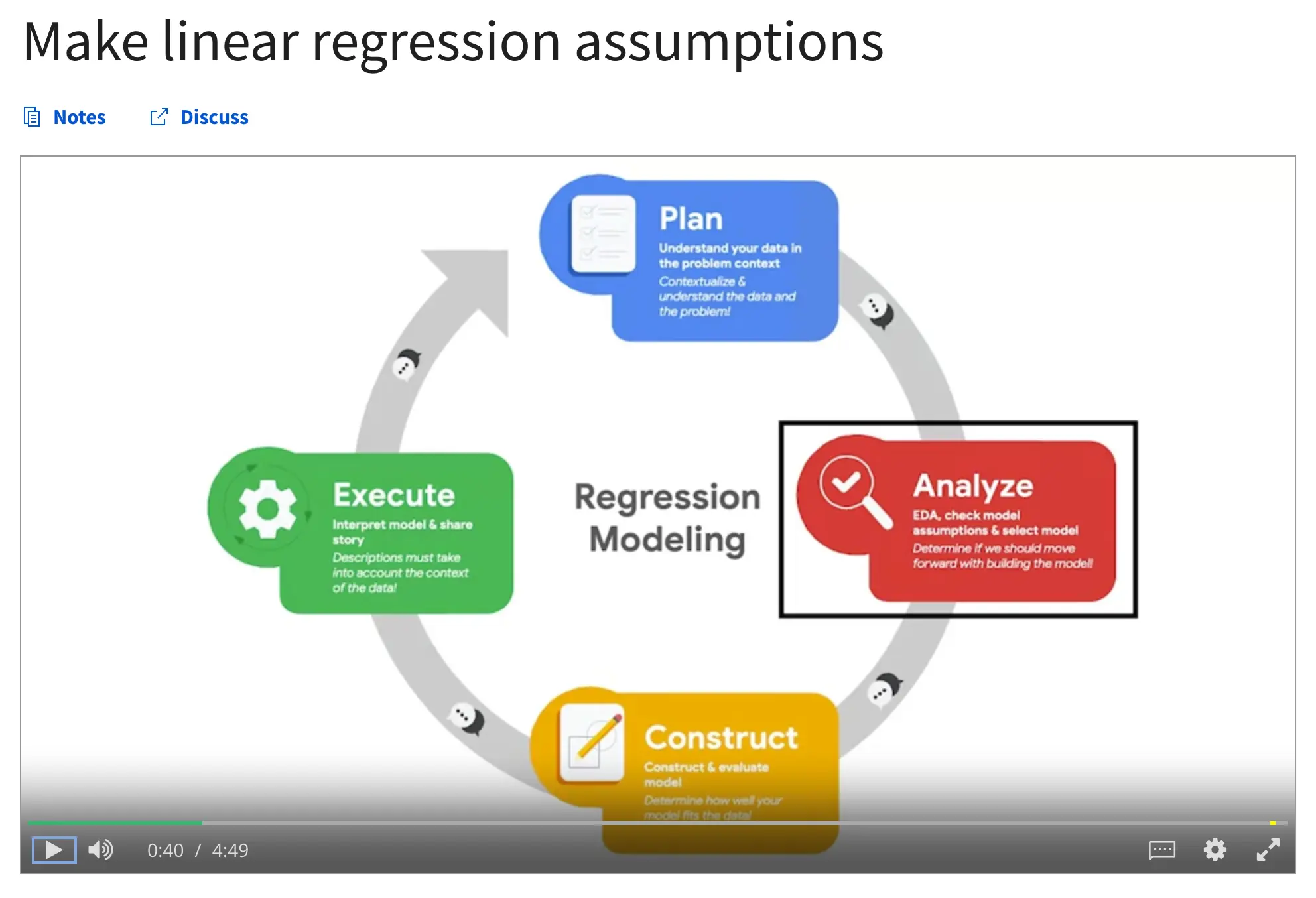
The course is spread over 6 weeks and takes around 30 to complete.
During week 1, you'll learn how to build regression models and better understand linear and logistic regression.
In week 2, you'll learn how to use data modeling to describe complex data relationships and how to build a simple linear regression model in Python.
Week 3 goes deeper into regression, and in particular, you'll learn how multiple regression builds on simple linear regression at every step of the modeling process.
Week 4 is practical and will teach you how to use hypothesis testing to explore two more statistical tests: Chi-squared and analysis of variance (ANOVA).
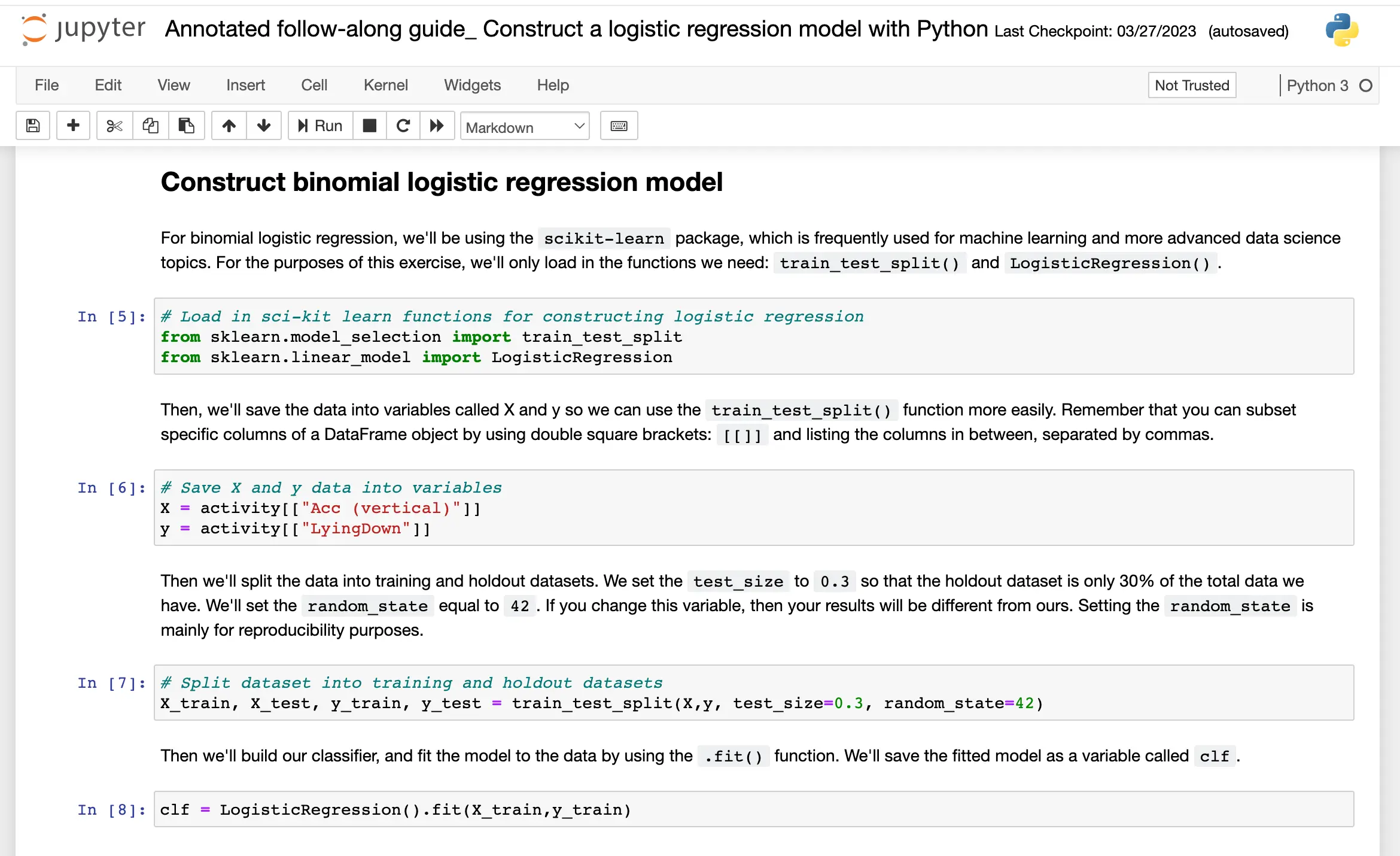
You’ll learn how data professionals analyze different data types using these tests. You'll also do your own analysis as part of the lab work of this course.
During week 5, you’ll learn how to build a binomial logistic regression model and how data professionals use this type of model to gain insights from their data.
To finalize this course, you must build a regression model to analyze a workplace scenario dataset for the end-of-course project, which may take around 5 hours to complete.
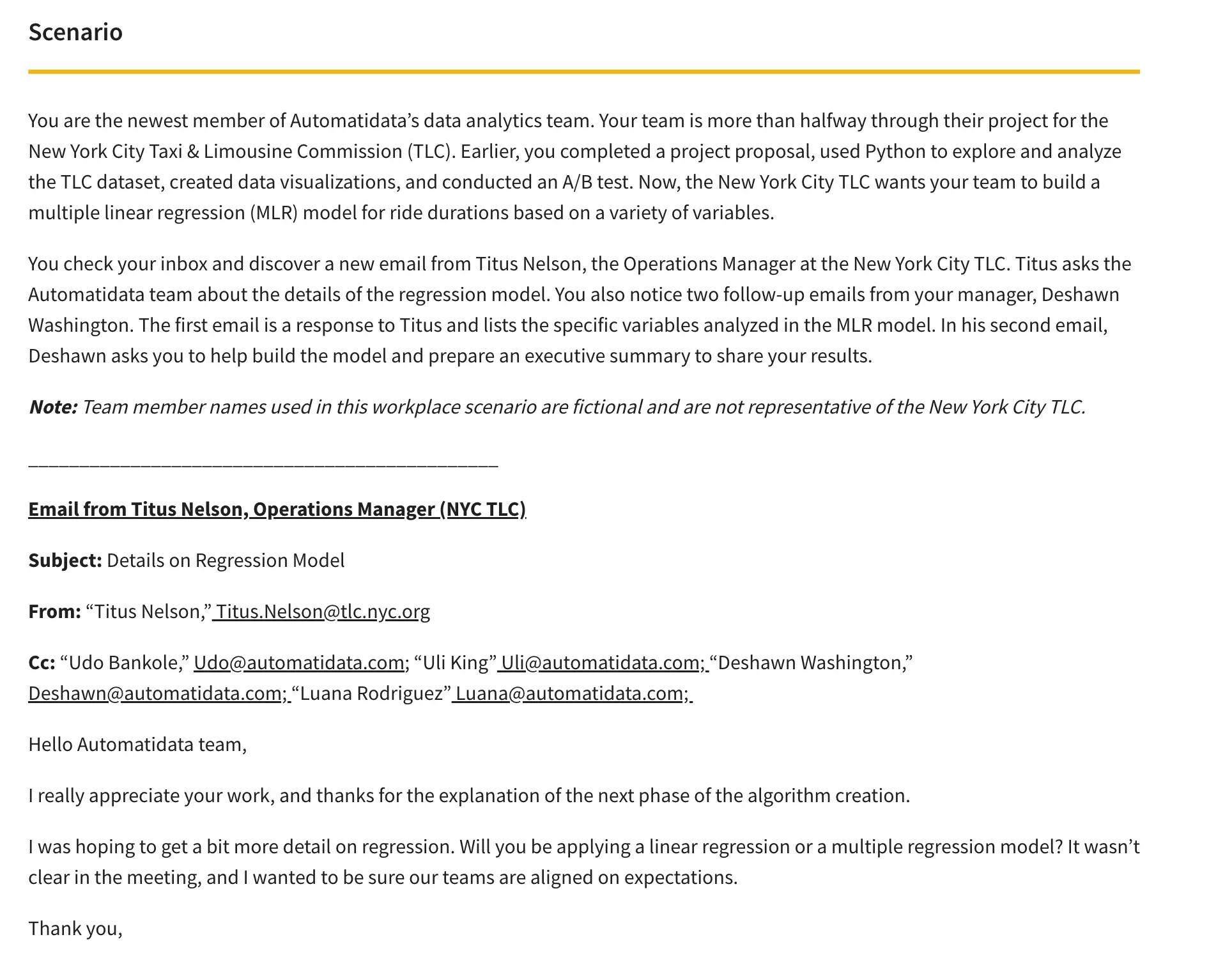
| Period | Topic | Time To Complete |
|---|---|---|
| Week 1 | Introduction to complex data relationships | 3 hours |
| Week 2 | Simple linear regression | 7 hours |
| Week 3 | Multiple linear regression | 5 hours |
| Week 4 | Advanced hypothesis testing | 4 hours |
| Week 5 | Logistic regression | 5 hours |
| Week 6 | Course 5 end-of-course project | 5 hours |
Course 6: The Nuts and Bolts of Machine Learning
The Nuts and Bolts of Machine Learning is the sixth and final course for this certification, is by far the most interesting one.
In this course, you’ll learn the basic concepts of machine learning and how to use it to solve data science problems.
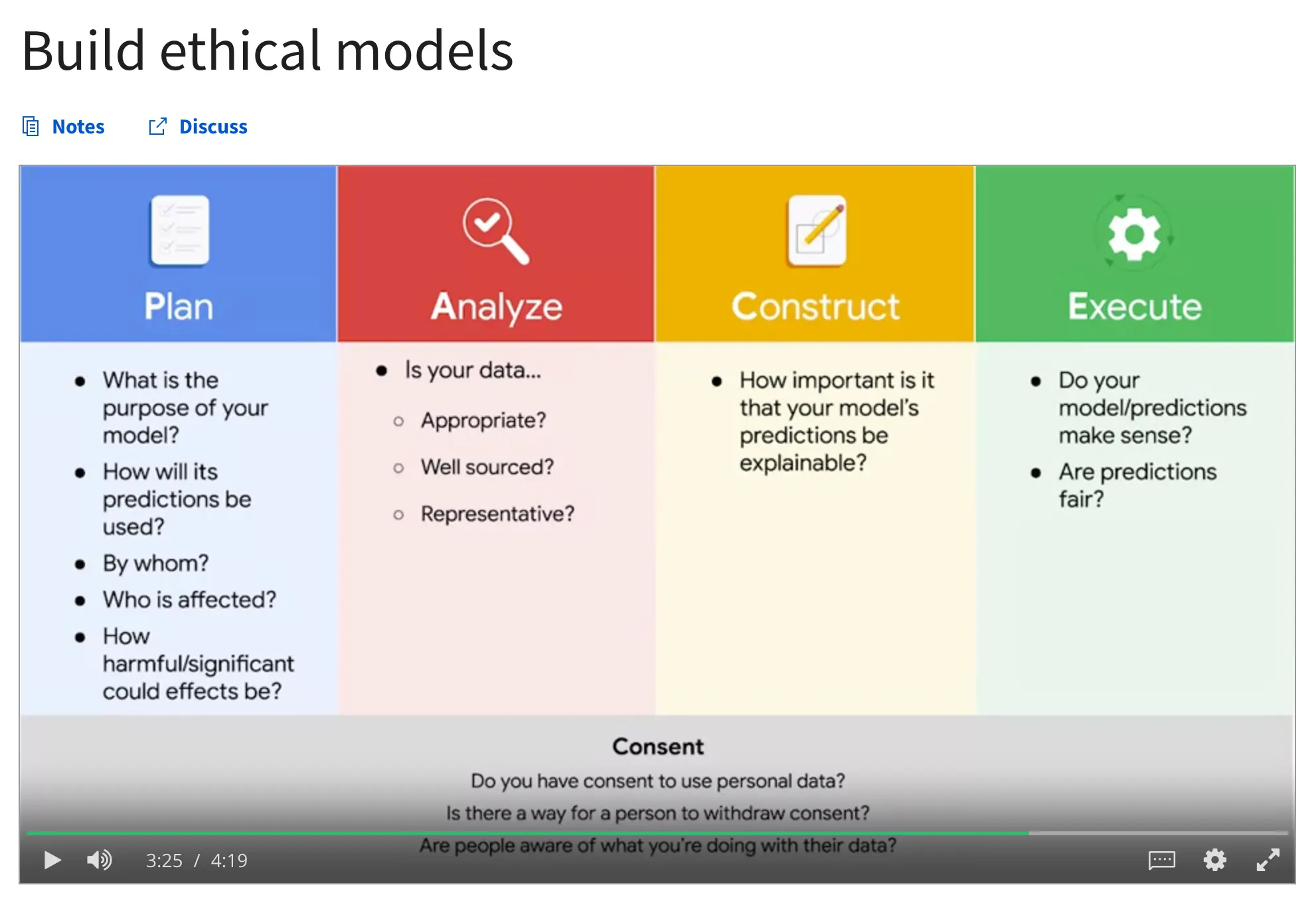
In week 1, you’ll be introduced to machine learning and how it works. You’ll learn what machine learning can do with data and how to build ethical models.
During week 2, you’ll learn how to plan a machine learning project and how to use Python to perform feature engineering.
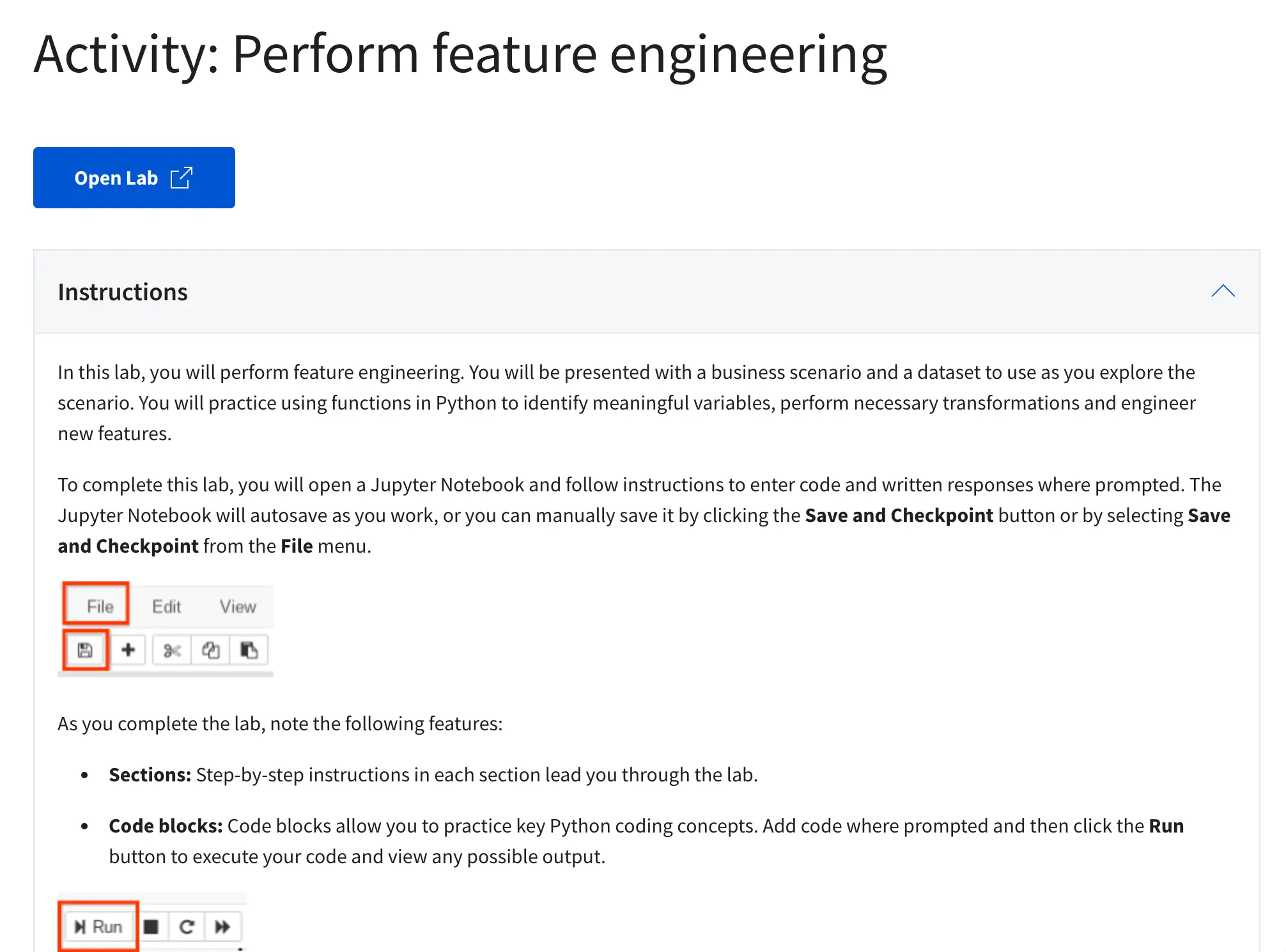
In weeks 3 and 4, you’ll explore other types of machine learning, particularly unsupervised and supervised learning. You’ll have to complete several practical labs that take around 3 hours.
In the final week of this course, you’ll get a chance to work on a project on applying different machine learning models to a workplace scenario dataset.
Here is an example of how the code you’ll have to write as part of the end-of-course project.
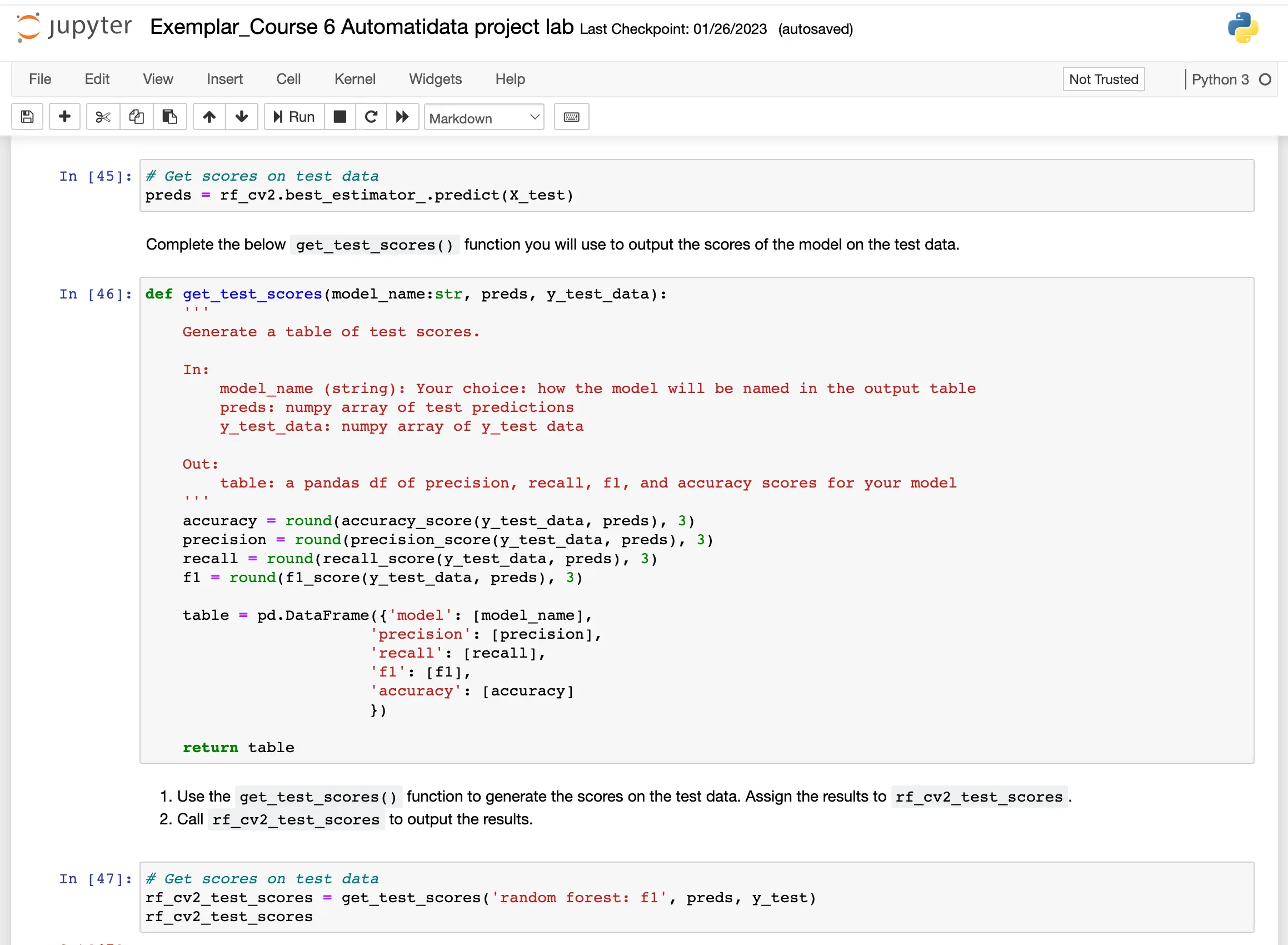
| Period | Topic | Time To Complete |
|---|---|---|
| Week 1 | The different types of machine learning | 5 hours |
| Week 2 | Workflow for building complex models | 7 hours |
| Week 3 | Unsupervised learning techniques | 5 hours |
| Week 4 | Tree-based modeling | 12 hours |
| Week 5 | Course 6 end-of-course project | 5 hours |
Course 7: Google Advanced Data Analytics Capstone
Once you get to this point, you’ll be 10 hours away from receiving your Googe Advances Data Analytics Certificate.
This is the final course, and it’s your chance to demonstrate your skills and create a case study for your portfolio.
Unlike other Google Career Certifications, the capstone project for this certificate is optional, and choosing whether or not to complete it will not affect your ability to receive your certificate.
Nevertheless, by completing the project, you will have an entire data analysis project from start to finish to showcase on your CV and share with prospective employers.
The scenario of the capstone project is pretty interesting too. You’re working as a data specialist for a fictional Frech-based alternative energy vehicle manufacturer. Your task is to analyze the results of a recent employee survey and develop ideas to increase employee retention.
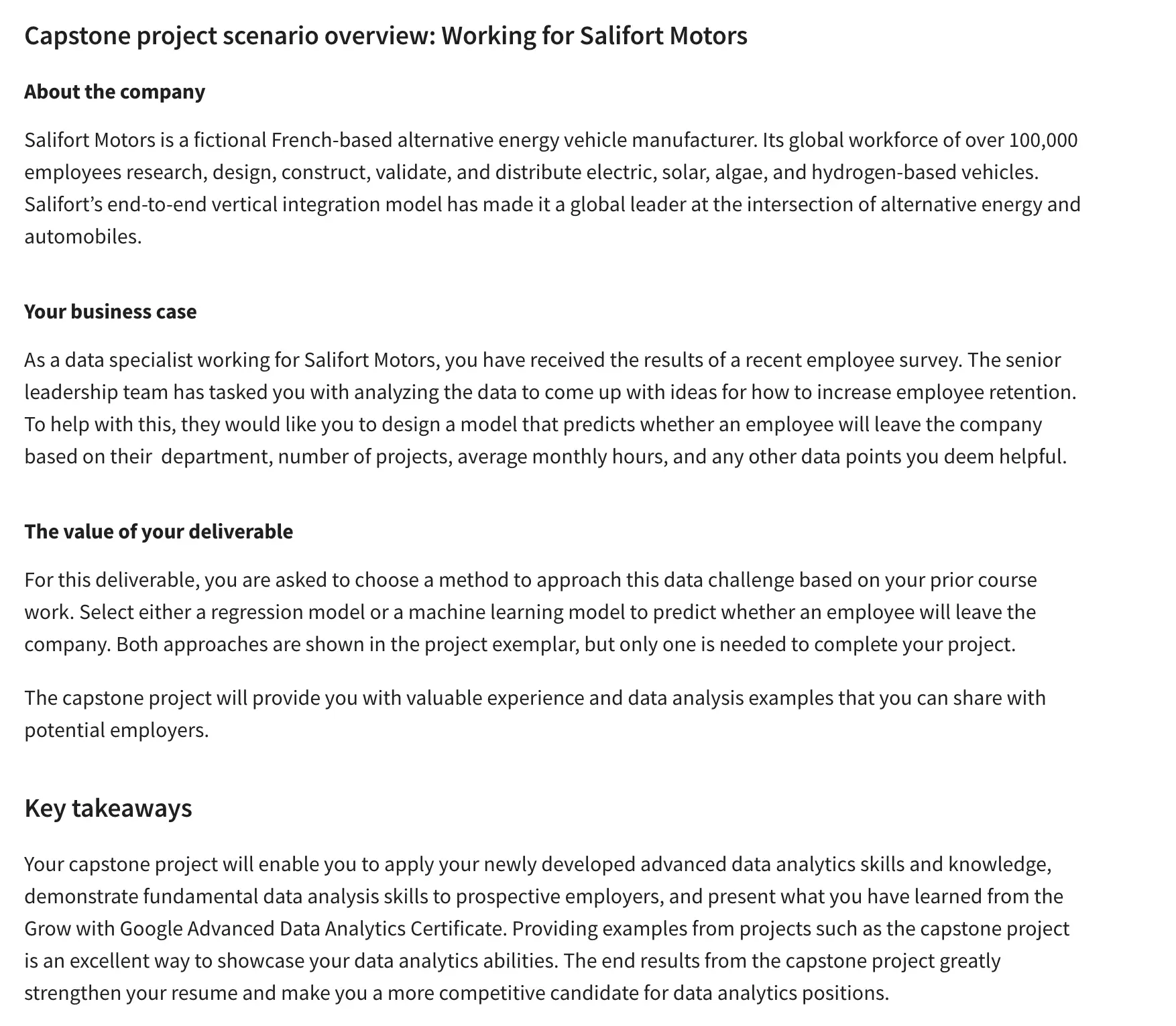
Besides working on the capstone project, in week 2 you’ll get tips on preparing your resume and applying for data analyst jobs.
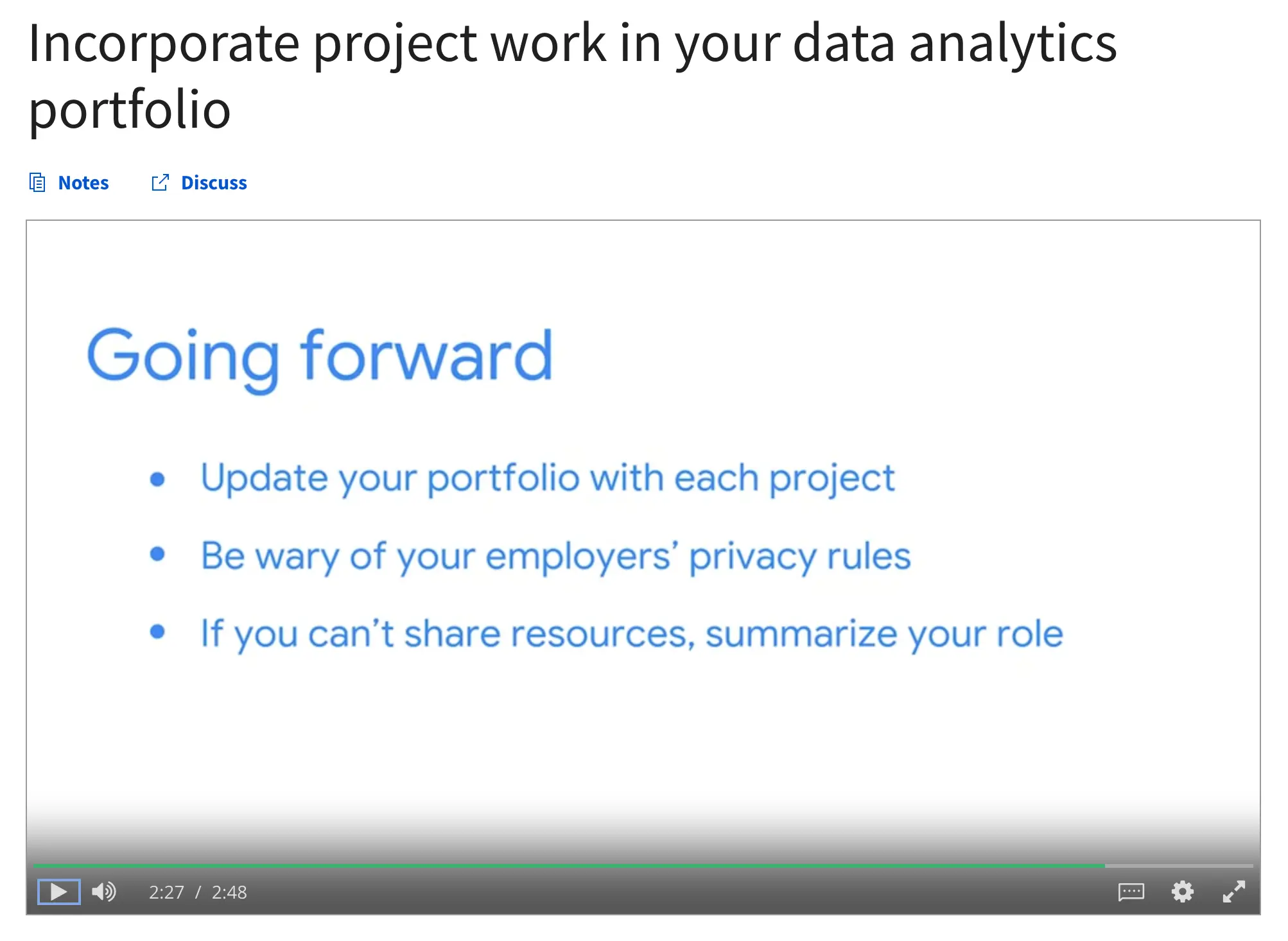
In week 3, you’ll learn how to get access to your digital badge and certificate and also answer a survey.
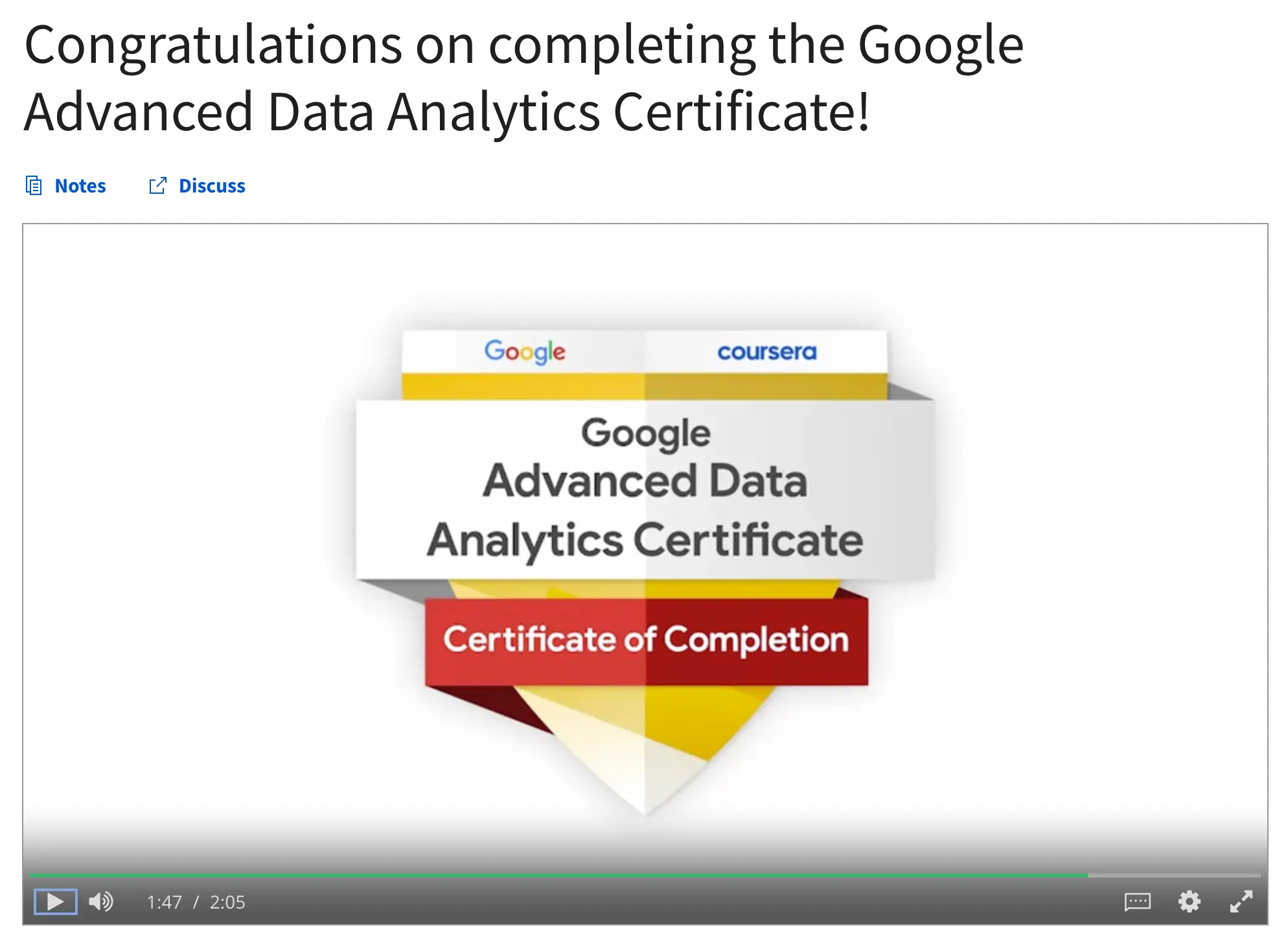
Here is a breakdown of the 10 hours of the final course.
| Period | Topic | Time To Complete |
|---|---|---|
| Week 1 | Capstone Project | 5 hours |
| Week 2 | Data-focused career resources | 4 hours |
| Week 3 | Put your Advanced Data Analytics Certificate to work | 1 hour |
Google Advanced Data Analytics Certification Exams
To get the Google Advanced Data Analytics Professional Certificate, you must finish the lessons of the six courses in the certification path, including all marked quizzes and labs.
As mentioned above, the capstone project (Course 7) is optional.
The quizzes are easy to do and straightforward. Below are a couple of sample questions to understand what the exams look like.
You’ll have to pass each quiz with a passing score of 80% and above. In case you fail a quiz, you can retake it in 24 hours.
How Hard is the Google Advanced Data Analytics Certification?
The Google Advanced Data Analytics Certification is not hard to get, but it takes time and effort to understand the advanced data analytics concepts.
It's not a certification for beginners. To follow the lessons, you need to complete the Google Data Analytics Certificate (entry-level) or have some working experience with data analysis.
The Google instructors did a great job in explaining how data analysis works, but to become an expert, you’ll have to do a lot of practice and spend hours outside the time required to finish the courses.
If your goal is to use the certification to get a high-paying job in data analytics, then just passing the exams and getting the certification is not enough.
You must ensure you know how to use the different models and Python coding for real-life data analysis work.
Is the Google Advanced Data Analytics Certification Worth it?
The Google Advanced Data Analytics certificate is currently one of the most prestigious certifications you can pursue if you want to make a career as a Data Analyst.
Through the seven courses, you’ll build in-demand advanced skills like statistical analysis, and Python programming, and you’ll learn how to use machine learning to solve real-life data analysis problems.
Upon completion, you can apply for various Senior level jobs and work as a data scientist earning a media salary of $118,000 annually.
As a holder of a Google career certificate, you can connect with over 150 U.S. employers searching for specialized employees.
Other Google Career Certifications
The Google Advanced Data Analytics Certification is a professional certification offered in the Google Career Certification program. The program includes five more courses.
You can read our detailed reviews of all Google certifications to decide which is the best certification for you,
- Google IT Support Professional Certificate Review
- Google IT Automation Professional Certificate Review
- Google UX Design Professional Certificate Review
- Google Project Management Professional Certificate Review
- Google Digital Marketing and eCommerce Certificate Review
You can also consider other Google Certifications covering a range of subjects.
Other Data Analytics Certifications Worth Pursuing
Google Data Analytics Professional Certification - This is a certification for beginners in data analytics. If you’re starting out now, this is the certification to do first, and then do the Google Advanced Data Analytics Certification.
IBM Data Science Professional Certificate - this data analytics certification offered by IBM is worth considering if you don’t want to do the Google certifications.
Best Data Analytics Certifications - a list of the top certifications in data analytics in the market today.

